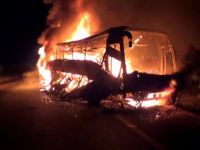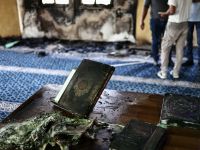Al-Amin Khalifa Fhimah, one of two Libyans on trial for allegedly preparing the bomb which brought down Pan Am flight 103 over Lockerbie in 1998, may be acquitted and released next week if his lawyer can prove there is insufficient evidence to convict him.
Fhimah and Ali al-Megrahi, both Libyan intelligence agents, have been on trial since May under Scottish law in special courtroom set up at Camp Zeist in the Netherlands.
Under Scottish law, the onus is on the prosecution to prove the defendant's guilt "beyond reasonable doubt" and on Monday, Fhimah's lawyer Richard Keen placed a "submission of no case" plea before the court, arguing that prosecuting lawyers had failed to do so.
Keen will attempt to justify his plea on Tuesday.
If the three Scottish judges hearing the case uphold Keen's intervention, Fhimah would be immediately acquitted and released. If the plea is over-ruled, he will remain in detention until the end of trial, which is expected to be in January.
For his part, Megrahi's lawyer William Taylor has announced his intention to reveal that a Palestinian group was behind the bombing rather than the Libyans as claimed by the prosecution.
The two intelligence agents are accused of preparing the bomb that brought down Pan Am flight 103, bound from London to New York, over the small Scottish town of Lockerbie on December 21, 1988, killing 259 persons aboard, mostly Americans. Eleven people also died on the ground as wreckage fell on the town.
The prosecution claims that the time of the bombing, both Fhimah and Megrahi were members of the Libyan secret services (ESO) and that Fhimah was also running a Libyan airlines office on Malta.
The two men are accused of checking the bomb onto an Air Malta flight as unaccompanied baggage, which was then transferred onto Pan Am flight 103 at Frankfurt airport.
The prosecution took seven months to present its case and called on 230 witnesses, but none of them was able to establish a direct and visual link between the bombing and the two suspects.
One key prosecution witness, Abdul Majid Giaka, a Libyan double-agent working for the CIA, said he saw the two suspects in Malta carrying a case similar to the one alleged to have housed the bomb.
However he never mentioned seeing the bomb itself, or the two men placing it in the suitcase, or the case being put on board the plane leaving Malta.
But the prosecution case against Megrahi is better founded and less fragmented than the case against Fhimah.
According to prosecution lawyers, Megrahi held a more senior ESO post than Fhimah, and his travels and his contacts with a Swiss manufacturer of the type of electronic timing device used in the bombing implicate him more fully.
But all the prosecution was able to show against Fhimah was his presence in Malta, with Megrahi, at around about the time of the bombing.
After a lengthy procedural battle, prosecuting lawyers also forced Fhimah to submit one of his diaries as evidence. The document, seized by Scottish police in Malta, has an entry several days before the bombing which reads: "collect the Air Malta tickets", followed by a second entry reading "OK".
But aside from the diary entries, evidence against Fhimah remains very fragmented.
Scottish judges rarely uphold a "submission of no case" plea, but some experts maintain that in Fhimah's case, it could still happen.
"There has been very little direct evidence that relates to Fhimah, and there has been more evidence in respect of Megrahi ... He (Fhimah) could be acquitted," said Clare Connelly, a legal expert from Glasgow university -- THE HAGUE (AFP)
© 2000 Al Bawaba (www.albawaba.com)







